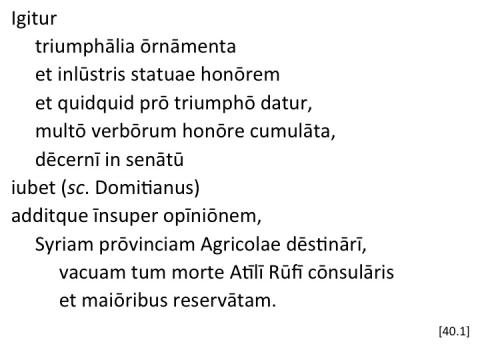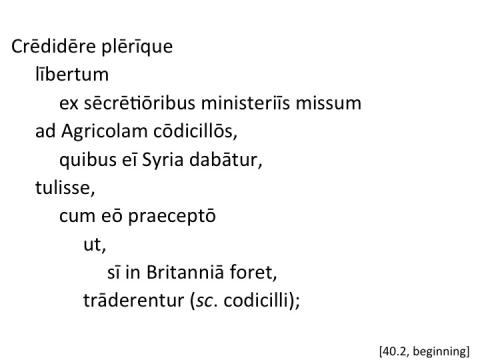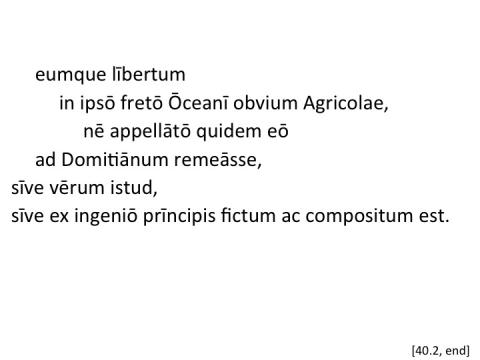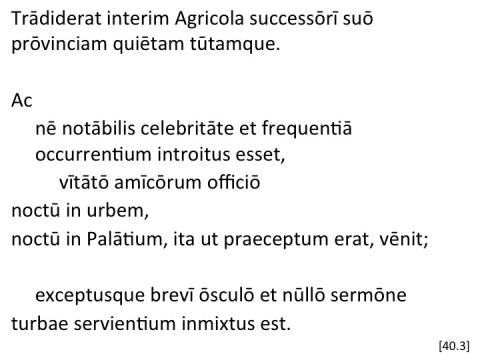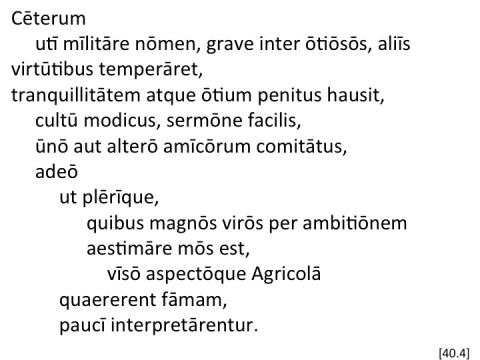Overview: Triumphal honors are decreed to Agricola; his recall; he is slighted by the emperor; his unostentatious deportment. (Stuart); this chapter begins on f. 63v of the codex Aesinas.
40.1
triumphālia ōrnāmenta: after the year 14 BCE the honor of a triumphal entry was rarely granted; instead of it triumphal decorations were decreed. (Stuart); i.e. the laurel wreath, the flowered tunic and gold-embroidered robe, and the state-chair. The "triumph" itself belonged only to the Emperor as commander-in-chief and possessor of the auspicia. (Pearce); e.g. the toga picta, tunica palmata, the laurel crown, the right to the title triumphalis. They were granted in lieu of a triumph, which could be celebrated only by the emperor or one of the imperial family. (Gudeman)
inlūstris statuae: the statua triumphalis, or laureata, as it is variously called, was since the time of Augustus placed in the Forum. (Gudeman)
quidquid: we should expect quidquid aliud. (Gudeman)
honōre: "compliment." (Stuart); the repetition of honore is possibly designed to convey the impression of the emptiness and meaningless character of these alleged marks of distinction. (Gudeman)
additque: Domitian also suggested that the senate should spread the information that, as an additional mark of imperial favor, Agricola's appointment as governor of Syria was soon to follow. (Gudeman)
opīniōnem: "an impression"; probably in the decree itself; perhaps otherwise. (Stuart); "the suggestion." opinio here = "that which gives rise to an opinion." (Pearce); shows that this intimation was not given in the decree itself, for only an official and actual announcement could have properly found a place there. (Gudeman)
tum: 84 CE. (Gudeman)
Atīlī Rūfī: probably identical with the P. Atilius Rufus mentioned in a military diploma of the year 80 CE as the commander of a number of cohorts and cavalry squadrons in Pannonia. (Gudeman)
maiōribus: "for men of more than ordinary distinction"; i. e. this rich province was, as a rule, given to men of peculiar distinction. (Stuart); "the more distinguished" (among the consulars). (Pearce); perhaps best taken in its regular sense of older men, for the meaning more distinguished, generally given to the word here, is not found elsewhere, although minores is repeatedly used for inferiores. But in either case, the term subserves the purpose of showing that the appointment was in the nature of a promotion, for Syria, as well as Britain, was a Caesarian province, both being governed by consulares with the same title of legatus propraetore. (Gudeman)
40.2
crēdidēre plērīque: with the initial position of the verb, especially common in this and similar phrases, see 9.2 and Introd. p. xxvi #3. (Gudeman)
ex: implies "of the number of those employed in." (Stuart)
ministeriīs: abstract for the concrete ministris. The theory that the Emperor was only primus inter pares led to the employment of freedmen in his personal service. This gave an absurdly great influence to men who, though clever enough, were quite out of sympathy with Roman traditions, and exercised a disastrous influence on the mind of the Emperor. (Pearce) sēcrētiōribus ministeriīs: "privy council." Freedmen often occupied the highest offices and the most confidential positions in the imperial household, and under bad emperors constituted not infrequently the real power behind the throne. (Gudeman)
cōdicillōs: "dispatches, orders." (Stuart)
dabātur: "‘was offered." The offer, we gather, was to be an inducement to Agricola to leave Britain, and was to be withheld if he had already left it. (Pearce); a kind of epistolary imperfect, regarded from the point of view of the recipient. (Gudeman) [A&G 479]
lībertum: repeated for the sake of emphasis. (Gudeman)
fretō: of Dover. (Stuart)
sīve vērum: viz. the current story just related. (Pearce); such phrases, qualifying a direct charge or innuendo, are specially characteristic of Tacitus. (Gudeman)
ex ingeniō: "to suit the character." (Pearce) ex: "in keeping with, in accordance with." (Gudeman)
40.3
trādiderat: the handover was probably in 84 CE (for the date see Introduction). (Damon); "as a matter of fact, he had handed over." On the emphatic position of the verb, see Introd. p. xxvi. (Gudeman)
successōrī: probably Sallustius Lucullus, executed by Domitian for naming a new kind of spear after himself. (Gudeman)
notābilis esset: "attract attention." (Gudeman)
celebritāte: "a complimentary reception by friends," seems to be the meaning, though Ruperti makes the word synonymous with frequentia. (Stuart) celebritāte et frequentiā: synonyms. See note on tranquilitatem atque otium below, and see note on 13.3 et in rempublicam. (Pearce) celebritāte et frequentiā occurrentium: "by the constant stream of people coming to meet him." (Gudeman)
officiō: "the attention." (Pearce)
noctū ... noctū: observe the effective anaphora. (Gudeman)
ut praeceptum: probably to be taken only with the immediately preceding clause. (Gudeman)
brevī: "with a slight"; cold and ceremonious. (Stuart) brevī ōsculō: "a perfunctory kiss." (Gudeman)
turbae servientium: "with the crowd of servile courtiers." (Stuart)
inmixtus est: passive not middle. The Emperor's studied neglect relegated him at once to the undistinguished crowd of courtiers. (Pearce); "he was mixed up, lost in the crowd of courtiers," and thus put on an equal footing with them, an additional humiliation. (Gudeman)
40.4
grave: "odious." (Stuart) ōtiōsōs: "men of leisure," not engaged in war. (Stuart) grave inter ōtiōsōs: "unpopular with civilians." (Pearce)
penitus hausit: "drank deeply of." A favorite Tacitean metaphor. (Gudeman); see 4.4, where, however, the phrase is less bold. (Pearce) hausit: other emendations for the manuscript's auxit have been accepted by other editors. (Damon)
cultū modicus: "unostentatious in his mode of life." We expect the genitive or in, ... but the simple ablative, though occasionally found with this adjective, is perhaps here primarily used for the sake of symmetry with those following. (Gudeman)
sermōne facilis: "courteous in conversation, affable." (Gudeman)
ūnō aut alterō: notice the simple ablative of accompaniment with comitatus. (Pearce) [A&G 413a]; "one or, at best, two." (Gudeman)
adeō: "so, to such a degree." (Stuart)
magnōs virōs: i.e. magnitudinem virorum. (Pearce)
ambitiōnem: "their display." (Stuart); "display," especially used of a large retinue of followers. (Pearce) per ambitiōnem: "by outward display," designed to gain popularity. See 29.1. The word here closely approaches its original meaning (captatio favoris). (Gudeman)
aestimāre: usually construed with a simple ablative or with ex; with per, though a very common substitute for the ablative in Tacitus (see note ch. 9.4), only here and in Liv. 38.47.10. (Gudeman)
aspectō: denotes closer attention than viso. (Pearce) vīsō aspectōque: the more specific term added to the generic, for adspicere implies seeing face to face. ... See Introd. p. xxx #17. (Gudeman)
quaererent: "sought for," i.e. inquired for the reason of his fame, and were unable to satisfy themselves in regard to it. (Stuart)
interpretārentur: "explained it," i.e. understood his motives. (Stuart); "gave the true explanation," viz. that real greatness is compatible with a modest deportment. (Pearce) paucī interpretārentur: i.e. a few understood the motives of his conduct (namely, the desire not to invite the open enmity of the emperor and the envy of the otiosi), and recognized his greatness in spite of his attempt to conceal it. (Gudeman)

